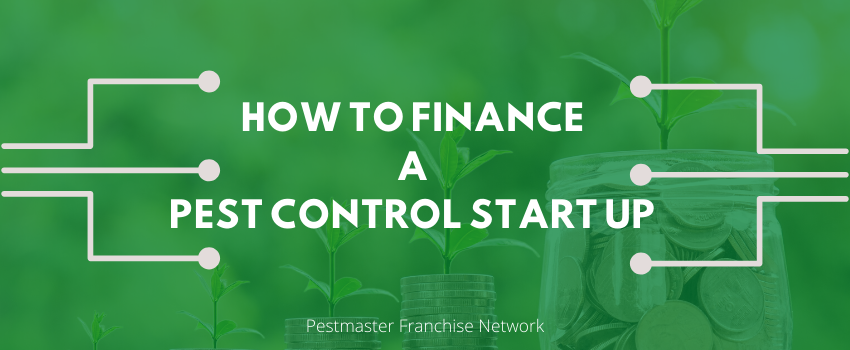How To Finance A Pest Control Business Startup

Today’s post evaluates four of the most common financing strategies used by pest control business startups, then explains how Pestmaster simplifies the whole process and reduces risk for first-time investors.
Evaluating Common Financing Strategies For Pest Control Business Startups
- The term “bootstrapping” dates back to the 1900s, according to research by the Small Business Institute Journal, referring to the act of “pulling oneself up by the bootstraps” (Falbe et al., 2011, p. 65). Entrepreneurs have been bootstrapping for more than a century, and it’s considered by some as a sign of creativity, but it’s certainly not easy.
Franchise financing literature identifies bootstrapping as the most common approach, with 86.2% of all 109 respondents reportedly financing themselves (Falbe et al., 2011).
One of the major drawbacks of bootstrapping, of course, is the personal risk. Bootstrapping means risking your own money and personal assets. But that risk is greatly reduced when you work with a company with a proven system and winning reputation.
- Loans from family and friends. Hitting up family and friends for start-up capital is fairly common, but it’s usually not recommended. Not only do you risk your financial future, but you also put important personal relationships at risk. Plus it rarely works out; research by the Small Business Institute Journal found that only 3-6% of all survey respondents successfully acquired start-up capital from friends and family (Falbe et al., 2011).
- Bank loans. Lending standards become more stringent every day, particularly amidst the COVID-19 pandemic. In one study by the Small Business Institute Journal, only one-third of respondents were able to secure business loans (Falbe et al,. 2011). Nevertheless, many big banks have funds earmarked for small business lending, so it’s worth a shot.
One of the major drawbacks of bank loans is the interest. Most bank loans come with high interest rates, which can stunt pest control business startup expansion.
- Equity loans. Angel investors, venture capitalists, and equity loans by government or other organizations can help finance your pest control business startup. But these aren’t easy to come by—in a franchise financing study, Falbe et al. (2011) reported that more than 80% of survey respondents could not secure outside equity investments.
Financing Your Pest Control Business Startup With Pestmaster
As the previous section showed, bootstrapping is probably your best bet, so long as you partner with a proven brand like Pestmaster. You can learn about all the ways we reduce your personal risk by visiting the Pestmaster “Why Franchise” page.
But there’s plenty we do to help beyond reducing your risk of bootstrapping. Here’s just a few ways we can help you finance your pest control business startup in 2020:
- Pestmaster minimizes start-up costs and overhead. The total initial investment cost ranges between $30,000 and $85,000, which is what most franchisees pay just for their franchise fee, according to Entrepreneur magazine. This amount includes as much as $30,000 of working capital to retain in case of shortfalls in the early months. Our business model also cuts overhead costs by minimizing equipment/inventory requirements and allowing owners to operate out of their home.
- Pestmaster offers discounts on franchise and territory fees. Pestmaster offers discounts that save entrepreneurs thousands on start-up fees and territories. Find out if you’re eligible on our Costs and Criteria page.
- Pestmaster offers in-house financing. We cover up to 50% of the cost of the franchise fee for qualified individuals.
- Pestmaster connects entrepreneurs to reliable lenders. We’ve built relationships with reliable third-party lenders who can help you launch your pest control business startup without brutal interest rates.
Learn More About Financing Your Pest Control Business Startup
Call 800-525-8866 or visit the Pestmaster franchise website to learn more about our opportunity.
References
Falbe, C. M., Kumar, A., & Welsh, D. H. (2011). Franchisee use of bootstrapping: An exploratory study of financing decisions. Small Business Institute Journal, 7(2), 63-70.
Back

















